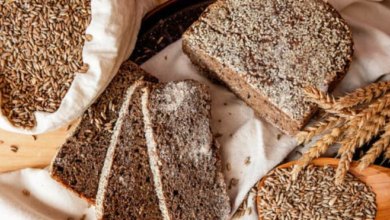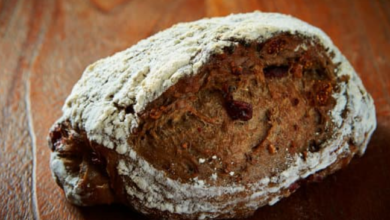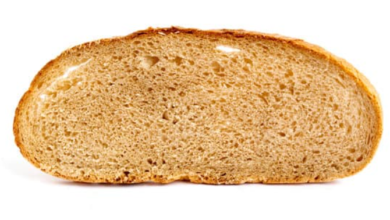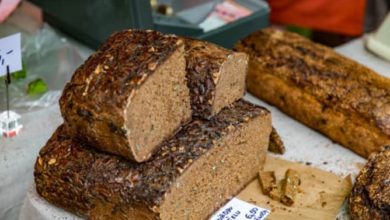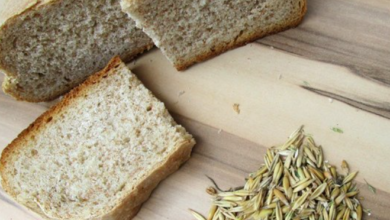Is Rye Bread Sourdough? The Answer Might Surprise You!
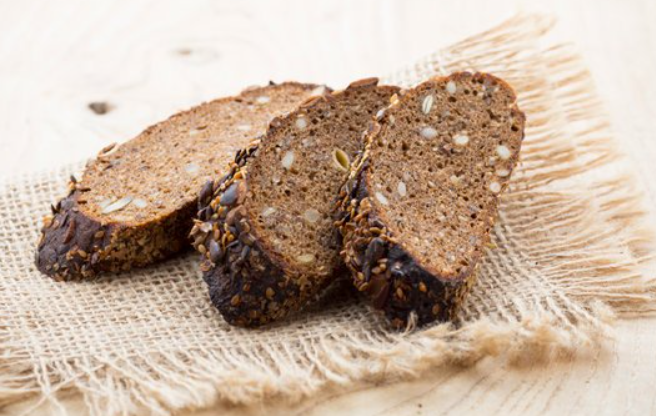
What To Know
- The wild yeast and bacteria in the sourdough starter consume the sugars present in the rye flour, producing lactic acid and acetic acid, which impart a tangy and slightly sour flavor to the bread.
- However, with the advent of commercial yeast and modern baking practices, rye bread can also be produced using commercial yeast, resulting in a bread that lacks the distinctive sourness and complexity of sourdough fermentation.
- Whether you prefer the tangy complexity of sourdough rye bread or the more subtle flavors of rye bread made with other fermentation methods, there is a rye bread out there to suit every palate.
Rye bread, a delectable and versatile culinary staple, has captivated taste buds for centuries. Its distinct flavor and dense texture set it apart from other bread varieties, making it a favorite among bread enthusiasts. However, a question that often arises is: is rye bread sourdough? To unravel this enigma, we embark on an exploration into the depths of rye bread’s history, ingredients, and fermentation process.
Sourdough: A Tale of Ancient Fermentation
Sourdough, an ancient fermentation technique, has been employed for millennia to produce bread with a distinctive tangy flavor and extended shelf life. This process relies on the natural presence of wild yeast and bacteria in the flour, which, when combined with water, create a sourdough starter. This starter is then used to leaven the bread dough, resulting in a slow fermentation that imparts the characteristic sourness and complex flavors of sourdough bread.
Rye Bread: A Versatile Canvas for Sourdough
Rye flour, derived from the rye grain, possesses a unique combination of properties that make it an ideal candidate for sourdough fermentation. Its high content of pentosans, a type of soluble fiber, contributes to the dough’s elasticity and water-holding capacity, resulting in a dense and chewy bread. Additionally, rye flour contains enzymes that enhance the activity of the sourdough starter, facilitating a robust fermentation process.
The Symbiotic Dance of Sourdough and Rye
When sourdough fermentation meets rye bread, a harmonious synergy unfolds. The wild yeast and bacteria in the sourdough starter consume the sugars present in the rye flour, producing lactic acid and acetic acid, which impart a tangy and slightly sour flavor to the bread. Simultaneously, the enzymes in the rye flour break down complex carbohydrates into simpler sugars, providing ample nourishment for the microorganisms in the starter.
Is Rye Bread Sourdough? Unmasking the Answer
So, is rye bread sourdough? The answer is both nuanced and multifaceted. Traditionally, rye bread was often made using a sourdough starter, as this technique was well-suited to the unique properties of rye flour. However, with the advent of commercial yeast and modern baking practices, rye bread can also be produced using commercial yeast, resulting in a bread that lacks the distinctive sourness and complexity of sourdough fermentation.
Sourdough Rye Bread: A Culinary Symphony
Sourdough rye bread, a testament to the harmonious marriage of ancient techniques and modern culinary artistry, offers a symphony of flavors and textures. Its tangy and slightly sour flavor profile complements a wide range of toppings and fillings, from savory cheeses and meats to sweet jams and fruits. The dense and chewy texture provides a satisfying bite, making it an ideal accompaniment to soups, stews, and salads.
Beyond Sourdough: Exploring Rye Bread Variations
While sourdough fermentation is a traditional method for making rye bread, it is not the only option. Other methods include using commercial yeast, a combination of sourdough and commercial yeast, or even a natural leavening agent known as a poolish. Each method imparts its own unique characteristics to the bread, allowing for a diverse range of rye bread experiences.
Embracing the Diversity of Rye Bread
Whether you prefer the tangy complexity of sourdough rye bread or the more subtle flavors of rye bread made with other fermentation methods, there is a rye bread out there to suit every palate. Embrace the diversity of rye bread and explore the myriad ways in which it can enhance your culinary adventures.
Frequently Asked Questions
Q: Is all rye bread sourdough?
A: Not necessarily. While sourdough is a traditional method for making rye bread, modern baking practices also allow for the use of commercial yeast or other fermentation techniques.
Q: What is the difference between sourdough rye bread and regular rye bread?
A: Sourdough rye bread is fermented using a sourdough starter, which imparts a tangy and slightly sour flavor. Regular rye bread may be made using commercial yeast or other fermentation methods, resulting in a less sour and more subtle flavor profile.
Q: Is rye bread healthier than other types of bread?
A: Rye bread is generally considered to be a healthier bread choice due to its higher content of fiber, vitamins, and minerals compared to some other types of bread.
